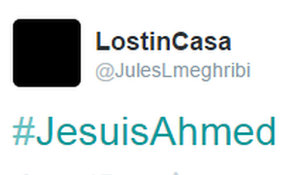Why the popularity of #killallmuslims is not all it seems
- Published
One of the more shocking Twitter hashtags to take off after the Charlie Hebdo attacks was #Killallmuslims, which has been tweeted about 100,000 times. But its popularity is not all it seems.
#Killallmuslims, external had been circulating at a very low level since 2013, and was given a boost by the attacks and its use by a Twitter user based in the US who was also posting hugely provocative images of Muslims and the Prophet Muhammad.
But what really propelled the trend were tweets by Muslims and others against the violent message. Nearly all of the most retweeted messages using #killallmuslims were actually criticising the sentiment.

In the immediate aftermath of the attacks on Charlie Hebdo, millions tweeted messages of solidarity under the hashtag #jesuischarlie, external ("I am Charlie"), and it continues to be a top trend worldwide.
With 2.8m tweets, #jesuischarlie dwarfs all other Charlie Hebdo trends. But other, more complicated reactions to the attacks have cropped up online.
Others - about 20,000 in all - used the hashtag #JeNeSuisPasCharlie, external ("I am not Charlie"). Many of those tweeters were distancing themselves, external from from the magazine's controversial - some of them say racist - depictions of Muslims and other minority groups in France. For instance, Charlie Hebdo once depicted French Justice Minister Christiane Taubira, who is black, as a monkey. The magazine is part of the French-language tradition of Bandes dessinées, external ("drawn strips"), some of which are provocative to a degree rarely seen in mainstream English-speaking media, even in the most satirical outlets.

Another group has picked out one victim of the attackers - 42-year-old policeman Ahmed Merabet, a Muslim who was shot in the street outside the Charlie Hebdo offices. The first person to use the #jesuisahmed, external ("I am Ahmed") was a French magazine publisher living in Morocco, Julien Casters, who tweets as @JulesLmeghribi, external (Jules the Moroccan).
"I decided to start the #jesuisahmed hashtag to remember that a French Muslim was also a victim of the attack," Casters told BBC Trending via email. "It is a snub to the stigmatisation of Islam and a reminder that Muslims in France are not all Islamist radicals. It seemed important to try to unite two years before the presidential elections in France, since the only ones to benefit from these terrorist acts are the extreme right political parties.
"I only wanted to share my opinion and my state of mind with my close friends and followers ... it seems that many people share my beliefs and did what's necessary to relay it to the masses."
#jesuisahmed has been mentioned more than 40,000 times on Twitter since the attacks.
Reporting by Sitala Peek, Ravin Sampat and Gabriela Torres
Blog by Mike Wendling
You can follow BBC Trending on Twitter @BBCtrending
All our stories are at bbc.com/trending